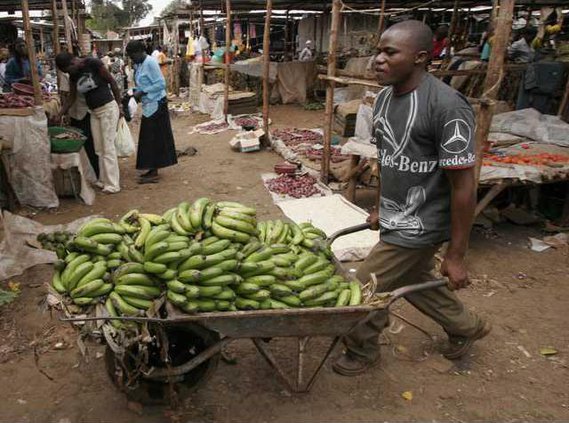ROME — U.S. Agriculture Secretary Ed Schafer said Wednesday that progress is being made at a U.N. summit on determining the role that biofuels are playing in driving up food prices to the point of provoking riots in some countries.
‘‘It looks as though consensus on this important issue is in reach,’’ Schafer said in a statement acknowledging there had been ‘‘some confusion’’ on earlier comments in which he sounded doubtful an agreement would be found by the end of the three-day summit in Rome.
Briefing reporters on the sidelines earlier Wednesday, Schafer had said: ‘‘I doubt there’ll be a positive agreement on biofuels.’’ He had indicated that he thought some ‘‘acceptable’’ language, apparently a compromise, on biofuels would be in the final summit document.
Fuels made from sugar cane, corn and other crops have been seen as a way to combat climate change and rising oil prices. The United States has been heavily subsidizing corn-based ethanol production. Last year, the 27-nation European Union endorsed a plan calling for biofuels to make up 10 percent of the fuel for road vehicles by 2020.
But environmentalists, international groups and some countries are becoming increasingly wary of biofuels, which they say could accelerate global warming by encouraging deforestation — and contribute heavily to the commodities price hike by diverting production from food crops to biofuel crops.
Studies by international organizations, including the International Monetary Fund, show that the increased demand for biofuels is contributing by 15 to 30 percent to food price increases, said Frederic Mousseau, a policy adviser at aid agency Oxfam.
‘‘In some cases, biofuel production is in competition with food supply,’’ Japanese Prime Minister Yasuo Fukuda told the summit. ‘‘We need to ensure that biofuel production is sustainable.’’
While agreeing that sustainability and innovation are needed, U.S. Agriculture Secretary Ed Schafer said biofuels contribute only 2 or 3 percent to a predicted 43 percent rise in prices this year.
Last month, Congress enacted a farm bill that reduced a tax credit for refiners by about 10 percent per gallon. The credit supports the blending of fuel with the corn-based additive. More money would go to cellulosic ethanol, made from plant matter.
Also Wednesday, U.N. Secretary-General Ban Ki-moon said as much as $20 billion per year will be needed to boost food production to combat hunger.
The three-day summit at the U.N. Food and Agriculture headquarters in Rome, which ends Thursday, was organized to come up with short-term solutions to the crisis and develop more lasting strategy to deal with its causes.
‘‘It looks as though consensus on this important issue is in reach,’’ Schafer said in a statement acknowledging there had been ‘‘some confusion’’ on earlier comments in which he sounded doubtful an agreement would be found by the end of the three-day summit in Rome.
Briefing reporters on the sidelines earlier Wednesday, Schafer had said: ‘‘I doubt there’ll be a positive agreement on biofuels.’’ He had indicated that he thought some ‘‘acceptable’’ language, apparently a compromise, on biofuels would be in the final summit document.
Fuels made from sugar cane, corn and other crops have been seen as a way to combat climate change and rising oil prices. The United States has been heavily subsidizing corn-based ethanol production. Last year, the 27-nation European Union endorsed a plan calling for biofuels to make up 10 percent of the fuel for road vehicles by 2020.
But environmentalists, international groups and some countries are becoming increasingly wary of biofuels, which they say could accelerate global warming by encouraging deforestation — and contribute heavily to the commodities price hike by diverting production from food crops to biofuel crops.
Studies by international organizations, including the International Monetary Fund, show that the increased demand for biofuels is contributing by 15 to 30 percent to food price increases, said Frederic Mousseau, a policy adviser at aid agency Oxfam.
‘‘In some cases, biofuel production is in competition with food supply,’’ Japanese Prime Minister Yasuo Fukuda told the summit. ‘‘We need to ensure that biofuel production is sustainable.’’
While agreeing that sustainability and innovation are needed, U.S. Agriculture Secretary Ed Schafer said biofuels contribute only 2 or 3 percent to a predicted 43 percent rise in prices this year.
Last month, Congress enacted a farm bill that reduced a tax credit for refiners by about 10 percent per gallon. The credit supports the blending of fuel with the corn-based additive. More money would go to cellulosic ethanol, made from plant matter.
Also Wednesday, U.N. Secretary-General Ban Ki-moon said as much as $20 billion per year will be needed to boost food production to combat hunger.
The three-day summit at the U.N. Food and Agriculture headquarters in Rome, which ends Thursday, was organized to come up with short-term solutions to the crisis and develop more lasting strategy to deal with its causes.

